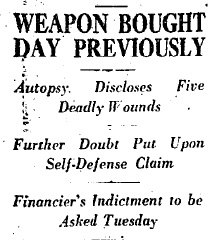
July 16, 1927
Los Angeles
“If I had a hammer
I’d hammer in the morning
I’d hammer in the evening…”
— “If I Had a Hammer”, written by Lee Hayes and Pete Seeger
Jacob Goldstein, President of Rothschild Mortgage and Finance, permanently ended his business partnership with the firm’s Vice President, Joseph Stern, by bashing him four times over the head with a hammer and firing three bullets from a revolver into his body. It would have been less messy if only Goldstein had let an attorney handle the dissolution.
Joseph Stern, by bashing him four times over the head with a hammer and firing three bullets from a revolver into his body. It would have been less messy if only Goldstein had let an attorney handle the dissolution.
Goldstein denied premeditating the attack, which occurred in the company’s elaborately furnished offices at 505 Hellman Bank Building, and swore to police that he had acted in self-defense. According to Goldstein, Stern had behaved like a lunatic and had menaced him with a hammer during a quarrel over business matters. Goldstein further stated that he was in fear of his life when he wrenched the hammer away from his future former partner, and then used the tool to crush the man’s skull. The coup de grace was delivered with the revolver he had purchased the day before.
Police found Goldstein’s explanation unbelievable and charged him with first degree murder. Goldstein entered a not guilty plea at his arraignment but was later allowed to plead guilty to manslaughter, for which he received a sentence of from one to ten years in the state pen.
It’s not easy to get kicked out of California forever, but Jacob Goldstein managed it. On the condition that he would move to Forest Hills, New York to live with friends, 63-year-old Goldstein was paroled from San Quentin on February 24, 1933.




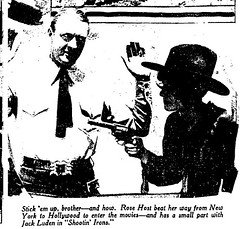 Luden. See – that’s Rose in the photograph, nothing more than a silhouette. Her part was so small she wasn’t even mentioned in the credits, and her Hollywood dreams ended with one picture. Rose Host the actress was not heard from again.
Luden. See – that’s Rose in the photograph, nothing more than a silhouette. Her part was so small she wasn’t even mentioned in the credits, and her Hollywood dreams ended with one picture. Rose Host the actress was not heard from again. 
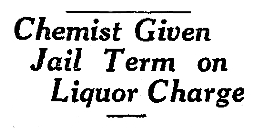 June 16, 1927
June 16, 1927 cases of assorted liquors, at his home bootlegging operation (complete with full bottling plant). Proprietor Fred had driven the coppers away with a gun but they’d come back with full force and broken down the door. And so before Municipal Judge Stafford went Fred, where today he was told he could pay $500 ($5,975 USD2005) or take fifty days. He took the fifty days. Ah, this, just a day like any other, here in Volstead-era Los Angeles.
cases of assorted liquors, at his home bootlegging operation (complete with full bottling plant). Proprietor Fred had driven the coppers away with a gun but they’d come back with full force and broken down the door. And so before Municipal Judge Stafford went Fred, where today he was told he could pay $500 ($5,975 USD2005) or take fifty days. He took the fifty days. Ah, this, just a day like any other, here in Volstead-era Los Angeles.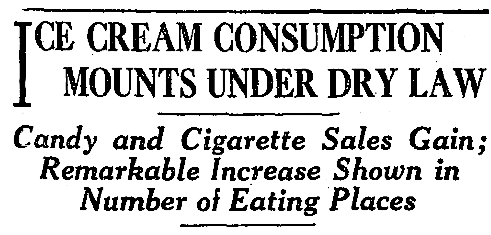

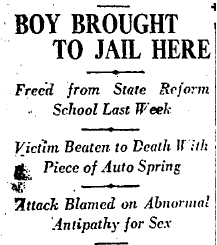 Today, 16-year-old Durward Wittenmeyer confessed to the murder of Fannie Weigel, the wife of a Pomona confectioner. It was just a few days since his release from the Whittier State School, a reformatory. The emotionally disturbed Wittenmeyer said that on his way home from the movies on May 28, he picked up an automobile spring leaf from a scrap heap, and "got a funny notion to hit someone." He saw Weigel walking home from the confectionery story, laden with bundles, and struck her twice in the side of the head. And what was the offense that had previously landed Wittenmeyer in juvie? Throwing a rock at a woman’s head in 1924.
Today, 16-year-old Durward Wittenmeyer confessed to the murder of Fannie Weigel, the wife of a Pomona confectioner. It was just a few days since his release from the Whittier State School, a reformatory. The emotionally disturbed Wittenmeyer said that on his way home from the movies on May 28, he picked up an automobile spring leaf from a scrap heap, and "got a funny notion to hit someone." He saw Weigel walking home from the confectionery story, laden with bundles, and struck her twice in the side of the head. And what was the offense that had previously landed Wittenmeyer in juvie? Throwing a rock at a woman’s head in 1924.
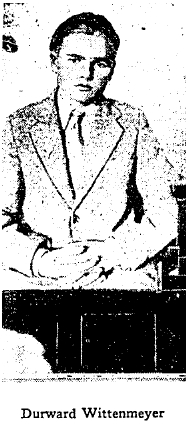

 May 19, 1927
May 19, 1927


 Convicted murderer Earl J. Clark was granted a stay of execution today as his appeal twisted its way through the State Supreme Court. There was a time when Clark’s chances to avoid the gallows seemed promising; however, following an escape from prison, things were looking grim.
Convicted murderer Earl J. Clark was granted a stay of execution today as his appeal twisted its way through the State Supreme Court. There was a time when Clark’s chances to avoid the gallows seemed promising; however, following an escape from prison, things were looking grim.
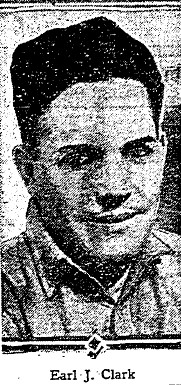 In July of 1925, Clark was sentenced to hang, but his attorneys immediately initiated an appeal to save his life. The appeal before the State Supreme Court was repeatedly delayed while Clark languished in the Los Angeles County Jail. On March 16, 1926, just days before his appeal was scheduled to come before the court, Clark and five others escaped from jail. While the five were quickly captured, Clark managed to go into hiding for over nine months. He was finally found in Minot, North Dakota, the proprietor of a paint store across the street from the local police station and husband to the daughter of one of Minot’s leading citizens.
In July of 1925, Clark was sentenced to hang, but his attorneys immediately initiated an appeal to save his life. The appeal before the State Supreme Court was repeatedly delayed while Clark languished in the Los Angeles County Jail. On March 16, 1926, just days before his appeal was scheduled to come before the court, Clark and five others escaped from jail. While the five were quickly captured, Clark managed to go into hiding for over nine months. He was finally found in Minot, North Dakota, the proprietor of a paint store across the street from the local police station and husband to the daughter of one of Minot’s leading citizens. 
